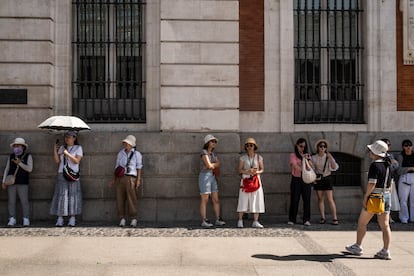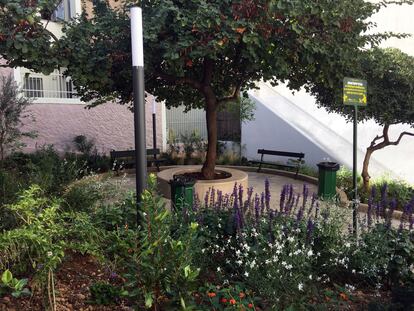UN global heat officer: ‘It’s criminal to build squares that do not have shade or cooling elements’
Eleni Myrivili talks to EL PAÍS about what can be done to cool down cities, the importance of taking action and how heat waves affect the most vulnerable

Rising temperatures and increasingly frequent heat waves driven by climate change are turning many Mediterranean cities into dangerous places, especially for vulnerable groups. “We are not focusing enough on how extreme temperatures affect urban environments,” says Eleni Myrivili, who has spent years studying this issue in her hometown of Athens, which is one of the cities hardest hit by rising temperatures. In 2014, she was elected Deputy Mayor of Athens for Urban Nature and Climate Resilience and, after a stay at Harvard University to investigate urban resilience to high temperatures, she returned to Greece to become the first chief heat officer in a European city. Her work in this area has earned her the position of global chief heat officer to U.N. Habitat. She talks to EL PAÍS as Greece is gripped by its worst heat wave on record.
Question. What is the job of a heat officer?
Answer. To protect the most vulnerable people — so that fewer people die from high temperatures — and to integrate different policies in the city to make it cooler. There are many aspects in a city that concern heat, and someone has to coordinate them. Imagine you have a lot of money, and you buy air conditioning for everyone: we would end up in those kinds of cities where everyone lives inside and going outside is unbearable. And in Europe, in Mediterranean cities, the beauty is outside: we love going out and drinking wine or beer at night, and having fun and going for walks and talking. It would be terrible if our cities ended up being uninhabitable. This is the nightmare we have to avoid: we cannot turn our cities into those of Abu Dhabi or Qatar.
Q. But most European cities do not have a heat officer.
A. They don’t have to be called a heat officer, they can also be people who work in sustainability or resilience. Cities are creating departments that work more horizontally and less in silos.
Q. How can cities cool down?
A. The most important thing is to bring nature to cities much more radically than before: nature and water are key to cooling them down. Trees not only provide shade, but also evapotranspire and recapture thermal energy, thus cooling the surrounding area as well. We also need shade, because it improves how we feel the heat. We have to make sure that our public spaces have more water, more shade and fewer cars, because cars are a problem in cities: they add heat, because they burn fossil fuels, and they emit hot air, just like air conditioning. Cars and air conditioning make our public space hotter. So we have to get rid of cars and use air conditioning to a minimum, particularly for people who need it. We also have to look for materials that are permeable to water, that do not absorb heat, and increase the shading of buildings and air circulation.

Q. What is Athens doing to mitigate the high temperatures?
A. We are doing things in three categories: awareness, preparation and redesign. In the first, we try to make people (journalists, politicians, everyone) understand how dangerous heat is: that we are having longer, more intense and more frequent heat waves, and that they are going to get worse. Last year more than 60,000 people died in Europe due to extreme heat, that’s a huge number, especially when compared to any other disaster. But we are still not ready. Until now, we didn’t know how to properly quantify people who die from heat, because many go to hospitals and die of a heart attack or something else, and they are not reported as heat-related deaths; now we count the excess mortality.
Q. What else have you done?
A. We have classified heat waves — something [Spanish city] Seville also does — with a specific algorithm for Athens. We use that algorithm to measure risk to people, in three categories: 1, 2, and 3. Three is very dangerous, we had one a few days ago. It’s important to categorize heat waves because that’s how our brains work: we think in categories for the most dangerous things. Also, this year we are starting to name the heat waves in Greece, something Seville did last year with Zoe. When you give it a name, people take it seriously, they understand that it is something that exists and that it is dangerous.
Q. And how is the risk communicated to the population?
A. We have an early warning system: depending on the category, we send differentiated warnings both to social services personnel who work with the vulnerable population and to those who are in nursing homes. They are messages that explain what to do to protect yourself from the heat, that you should not go outside at certain times... We also have a program to visit the elderly in their homes to make sure they are well. And this information is received by day car centers, the coordination center of NGOs that work with refugees or immigrants, with homeless people... We try to inform those who work with vulnerable people.
Q. What measures have been taken to prepare for extreme heat?
A. We’ve launched a hotline for people to call if they need help or want to ask anything [about the heat]. It is attended by municipal staff and the Red Cross. We have also created a website so that people know how to take care of themselves, how to cool their homes and what to do if they suffer from heat stroke. In addition, we have a cellphone application called Extrema Global, and it tells you every day what your personalized risk is when you walk around the city and where are the cool places you can go, from public facilities with air conditioning to train stations, subway stations, swimming pools, parks... The app also tells you how to get from point A to point B through the coolest streets, because they have included all the trees. The Red Cross takes vans with water and information to tourist areas. And we have opened cooling places where people can go during heat waves.
Q. These people could be considered climate refuges.
A. Yes. Cooling centers are necessary for people in a situation of energy poverty, or who are not well at home. It would be great if people could come together in these kinds of air-conditioned places, especially the lonely, the elderly, the vulnerable. But for now, in general, they are not going, because they feel stigmatized there, because it seems that only the poor go. We have to turn them into more interesting places, or link them with cultural events. We are opening cooling centers, but many people are not going. You also have to make refreshing spaces outside, with shades and play areas for children, to make them more attractive to everyone.
Q. What is urban redesign?
A. We have created some guidelines on how to make public spaces — streets, squares and parks — designed to be cool, with plants, water and different materials. But, if we don’t limit cars and asphalt in cities, we won’t have enough space to make them cooler. That space can be used to create linear parks on the streets. We have created small, very dense green areas in streets and intersections, called pocket parks, which help increase biodiversity and favor the wind. What’s more, we have created narrower lanes, so cars have to go slower. Spain is doing incredible things in this area: Barcelona is taking space away from cars to make superblocks. And in Oslo they have already gotten rid of most of the cars.

Q. What do you think about building squares without shade, like the Puerta del Sol square in Madrid?
A. Today, it is criminal to build squares without shade or cooling elements, because they create higher temperatures in the city, put people’s lives at risk and keep people away from public space. It is very crazy to design squares as if climate change did not exist.
Q. What will happen to cities that do not adapt?
A. Many people will die in these cities, and many others will lose their jobs. It will affect the economy, because a lot of income is lost due to extreme heat: productivity drops, people go to shops less because people stay at home... And we will have to make an effort to avoid shortages of water, food and power cuts during heat waves. Adaptation has to do with food and medicine, logistics and with the people who are going to be hospitalized and die. We have to prepare our hospitals for days of extreme heat.
Q. Why is it so important to talk about heat?
A. The heat exposes the vulnerability of our cities and affects those worst-off: people who are sick — physically or mentally —, and the elderly and young children; it affects the most vulnerable people in our society, those who do not have good housing, who are low paid, who suffer from energy poverty, and cannot turn on the air conditioning or live in good conditions, people who cannot afford to drive or catch a plane and go to a cooler place when it is very hot in the city. These people must be protected.
Sign up for our weekly newsletter to get more English-language news coverage from EL PAÍS USA Edition
Tu suscripción se está usando en otro dispositivo
¿Quieres añadir otro usuario a tu suscripción?
Si continúas leyendo en este dispositivo, no se podrá leer en el otro.
FlechaTu suscripción se está usando en otro dispositivo y solo puedes acceder a EL PAÍS desde un dispositivo a la vez.
Si quieres compartir tu cuenta, cambia tu suscripción a la modalidad Premium, así podrás añadir otro usuario. Cada uno accederá con su propia cuenta de email, lo que os permitirá personalizar vuestra experiencia en EL PAÍS.
¿Tienes una suscripción de empresa? Accede aquí para contratar más cuentas.
En el caso de no saber quién está usando tu cuenta, te recomendamos cambiar tu contraseña aquí.
Si decides continuar compartiendo tu cuenta, este mensaje se mostrará en tu dispositivo y en el de la otra persona que está usando tu cuenta de forma indefinida, afectando a tu experiencia de lectura. Puedes consultar aquí los términos y condiciones de la suscripción digital.








































